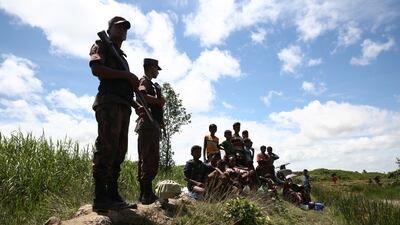Fears for the safety of international workers and vital aid efforts in troubled Rakhine State were raised on Sunday after the Myanmar government highlighted claims that international NGO staff had collaborated with terrorists, even as violence sparked by deadly attacks continued for a third day.
The government's allegations – condemned by observers as dangerously inflammatory – came as Reuters journalists on the border reported hearing gunfire from the Myanmar side as thousands of Rohingya refugees, mainly women and children, waited to cross the Naaf river into Bangladesh. The government said over 4,000 non-Muslim residents had been evacuated.
On Sunday, a Facebook post by State Counsellor Aung Sun Suu Kyi’s information committee, said the government was investigating the validity of “news” that international aid workers were among a group of “Bengali extremist terrorists” who had circled Taung Bazzar village the day before.
The government then immediately referred back to the discovery of food parcels from the UN’s World Food Programme at an abandoned terrorist camp on July 30. The post also showed a picture of WFP parcels along with gruesome photos of the bodies of what it said were members of a Hindu family of six – three adults and three children – who had been killed by terrorists on Saturday.
The UN said on Sunday it was evacuating non-essential staff from the conflict-hit north "in light of the situation on the ground". The withdrawal is understood to have already been under way before the allegations were made.
“WFP is aware of a photo of one box of WFP biscuits reportedly found in an alleged insurgent training camp last month. WFP takes any allegation of food diversions very seriously," a media representative of the Office of the Resident and Humanitarian Coordinator in Myanmar said. "We have requested more details from the authorities and asked to see the batch number of the biscuits as this will allow us to trace its origins and distribution site."
Earlier this month, protests were held in the state capital Sittwe calling for international workers to be evicted from Rakhine. The UN also warned staff of security risk amid heightened anti-foreign tensions from the ethnic-Rakhine community.
Francis Wade, the author of Myanmar's Enemy Within which investigates anti-Muslim sentiment in Myanmar, said Sunday's post could "encourage direct attacks on aid workers who are seen to be complicit" and would threaten supply of aid to people who desperately needed it.
Most international NGO staff have not been granted travel permissions for the north in recent weeks, but the withdrawal of UN staff and other aid workers from the north is expected to further exacerbate the desperate levels of malnutrition in the region where many children are already perilously close to starvation level.
It will also further reduce international representatives in the area where allegations of rights abuses are rife, particularly after Muslim insurgents attacked police posts in October last year, putting the region under lock down while brutal reprisals were widely alleged to have been conducted.
Mr Wade warned the government's statement could play into broader anti-foreigner sentiment.
The post condemned foreign media for referring to the Arakan Rohingya Salvation Army (Arsa) as insurgents rather than terrorists, threatening to use international police to bring legal actions against foreign media deemed to be supporting the group. Myanmar on Friday declared the group a terrorist organisation.
“The government has already accused agencies like the UN of deliberately orchestrating a smear campaign to tarnish the country's image by highlighting the army's crimes. What concerns above all is that the civilian government will know the consequences - that this kind of rhetoric directly influences whether people participate in attacks on Rohingya and aid groups. Yet it proceeds nonetheless,” he said.
____________________
Read more:
Terror and persecution go on for Myanmar's Muslim minority
Fresh violence kills 71 in Myanmar's Rakhine State
What hope now for the Rohingya in Myanmar?
____________________
The UN and most other international NGOs are commonly perceived by the Buddhist ethnic Rakhine community to be biased in favour of the Rohingya Muslims - over 100,000 of whom have been confined to camps since violence broke out between them and their ethnic Rakhine neighbours in 2012.
In 2014, a rampaging mob attacked the bases of international NGOs in the town after growing tensions erupted when an international worker was accused of disrespecting a Buddhist flag.
“Things are as tense here for international staff,” one Sittwe-based international aid worker said on Sunday, comparing the current situation to 2014.
Ms Suu Kyi has previously accused international governments and organisations who have condemned Myanmar’s treatment of the Rohingya of inflaming tensions. She has been criticised in some international circles for aligning herself with the military over allegations security forces have committed rights abuses against Rohingya civilains and backed a refusal to allow UN fact-finders to investigate allegations of crimes against humanity and ethnic cleansing.
By agreeing on Thursday to include international and regional representatives among those tasked with implementing the recommendations of former UN chief Kofi Annan’s Advisory Commission on the Rakhine state, Ms Suu Kyi appeared to be offering some hope that some international input into the solution for the long-running tensions would be continued.
But Sunday’s post from her information committee will only serve to heighten wider public mistrust of any foreign involvement.
Rakhine erupted into fresh violence in the early hours of Friday morning when Arsa conducted deadly attacks on 30 police posts – just hours after the commission led by Mr Annan delivered its recommendations on how to ease the ethno-religious tensions.
More than 1 million Rohingya Muslims live in Rakhine, most of them denied citizenship or basic freedom of movement.
The latest figures on Sunday placed the death toll in the wake of Friday’s attacks at 98 – including 12 security personnel and around 80 insurgents.
With northern Rakhine still under lock-down, it remained difficult to get a clearer picture of the situation on the ground, with social media posts including claims and counterclaims of violence on both sides.

